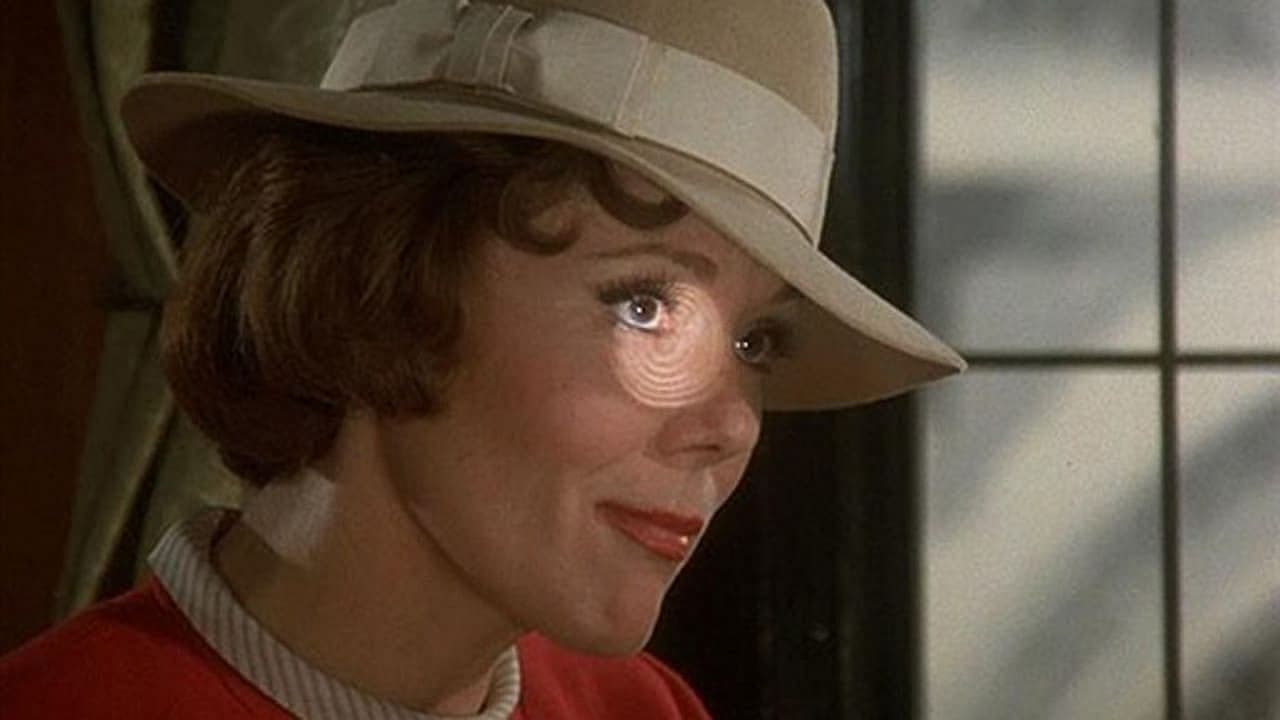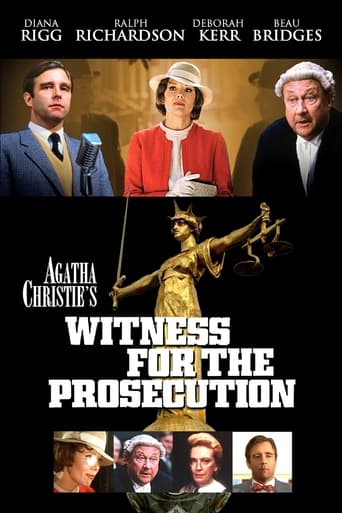Steinesongo
Too many fans seem to be blown away
Solemplex
To me, this movie is perfection.
ReaderKenka
Let's be realistic.
Teddie Blake
The movie turns out to be a little better than the average. Starting from a romantic formula often seen in the cinema, it ends in the most predictable (and somewhat bland) way.
mark.waltz
I recall seeing this on TV back in 1982 long before I got to see the original 1957 film version of Agatha Christie's short story, eager to see after a long absence the ageless Deborah Kerr and the exquisitely beautiful Diana Rigg, whom I had just seen on the big screen in the Agatha Christie murder mystery "Evil Under the Sun". Those who are huge fans of the 1957 Billy Wilder film will be either hugely disappointed or impressed by the subtle changes, where characterizations of the major players are quite different than they were 25 years before. Sir Ralph Richardson isn't as doddering as Charles Laughton's barrister, perhaps more fragile yet equally determined to remain vital in his beloved profession years after most people retire from it. I find that added more of a quality of me rooting for him more, because with Laughton, you know he was already crafty, where with Richardson, it's somewhere beneath the surface and must come out gradually as points of the murder case are revealed to him and everything comes together. Deborah Kerr, second billed in the supporting role of the nurse that Elsa Lanchaster played, is feisty and no-nonsense, but she's not as flighty in her line delivery as the former Bride of Frankenstein was. The film starts with the legendary Wendy Hiller (a co-star of Kerr's from "Love on the Dole" and "Separate Tables") walking down a dark London street, and it is assumed that she will be the victim. But her walk is merely filmed to set up the atmosphere, as she walks into the home of her employer's, sees her laughing with an unseen visitor, and goes upstairs. A sudden crash and only the tiniest hint of a scream gives the indication that something nefarious has occurred, and indeed, when Hiller goes downstairs, she finds her employer dead and the room a ramshackled mess. Beau Bridges comes to see Richardson, certain he will be accused of her murder because of extenuating circumstances (he's been left the dead woman's estate), and over Kerr's objections, Richardson decides to take on his case when the arrest does finally occur. But the presence of Bridges' wife (Diana Rigg) puts a damper on Richardson's defense, especially when she is outed on the witness stand for being a liar and a bigamist. A surprise phone call to Richardson promises to turn the case around, and that of course, leads to some delightful twists and turns where another case becomes imminent for the energetic Richardson, revitalized after such a complex case.I see my original rating, prior to writing this review , was a "10", and as good as this is, it is not perfect. I could have sworn it was multi-nominated for several acting Emmy's or Golden Globes, but found that not to be the case. Perhaps 25 years later after the film, there really were few surprises to discover in this Christie short story, even though the cast (particularly Rigg) is excellent. TV movies in the early 1980's also re-did a lot of the classic tales movie audiences were familiar with, coming around the time of another "Scarlet Pimpernel", "A Christmas Carol", "Oliver Twist" and various other classics of literature and the theater. Still, every detail in this TV version is letter perfect, with the mid 50's atmosphere so luscious, and location footage of the historical landmarks of London making me wish I was there right now. Rarely are remakes better than the original, and rarely are they just as good or even memorable. The aspect of that alone makes this worth seeking out, even if you are, like several friends of mine, major fans of the Laughton/Dietrich/Power version that is considered one of the great mind blowing mysteries of all time.
Robert J. Maxwell
It's impossible to watch this TV program without comparing it to Billy Wilder's 1957 version, and both are of professional caliber.If Wilder's is the better iteration (out of a total of five or so) it's partly because of its bigger budget. This sticks closer to the play or so I'd guess. There are only three fully developed sets, whereas Wilder could take us to a knockabout pub, a wreck of Hamburg, and the murder victim's kitchen where a nervous Tyrone Power demonstrated a double egg beater.The 1957 version was also chipper, which this one isn't. Wilder put more emphasis on Sir Wilfred Brimley's preadolescent naughtiness, sneaking cigars and brandy like a child. Ralph Richardson, as Sir Wilfred, who handles the defense of Leonard Vole (Beau Bridges) is sly enough but slow and some of the energy is drained from the narrative. Nor is Diana Rigg, with whom I was deeply in love, quite as authentically nasty as Marlene Dietrich, and her German accent is almost bleached out. Even Wendy Hiller, superb actress, isn't the equal of Una O'Connor as the housekeeper, Mrs. Jackson. Just compare their delivery of one word in response to a judge's inquiry: "Why?" O'Connor snaps it fiercely back as a challenge at His Honor, while Hiller's sounds like a puzzled query.None of this is to put down this presentation. It's all done smoothly, despite Beau Bridges not being the actor Tyrone Power was, and not being allowed by the director to ham it up quite so deliciously. You may think me an insensitive bulb for preferring Power's operatic performance. Well, I am but that's not the point.The ending is the weakest part. I don't mind the surprise involving Vole and his wife Christine. But the "honey blond" pops out of nowhere like a Jill in the Box and is clearly only there to see that justice is served.No reason to miss it though. It's a damned good story.
Marlburian
Having just watched the 2016 version on BBC TV in Britain, I found the 1982 version on Youtube. The central character is the defence council, here Sir Wilfred Robarts, even frailer than the 2016 Mayhew, with some perhaps unnecessary light relief provided by his attempts to outwit his full-time nurse.It could almost have been a filmed stage play, with nearly all the dialogue being in the court-room or in Sir Wilfred's chambers. This version was reasonable enough until after the verdict, when one person has to boast how clever they've been, thus giving the game away, and there's a final, unconvincing twist.
borsch
This remake of the Laughton/Power/Dietrich film is quite enjoyable, owing to skillful casting, top production values, and, of course, Dame Christie's cracking good story. Sadly, the only liability is the performance of Sir Ralph Richardson (It's almost unspeakable to say this; I feel like Brutus plunging the knife into his Caesar). This was one of his last performances, and his immense skill simply cannot overcome his advanced age. (Granted, his character is supposed to be aged and ill, but Sir Ralph is unable to act intrigued and energized by his last case the way Laughton was in the original.) Still, his presence alone delivers barrels full of audience goodwill, and the piece is anchored by fine performances from Diana Rigg in the Dietrich role, Deborah Kerr in Elsa Lanchester's part (a fun bit of off-casting!) and by Beau Bridges, who stretches himself beyond his normal nice-guy blandness and convinces in the Ty Power role. A nice movie for a rainy afternoon or a boring holiday!

